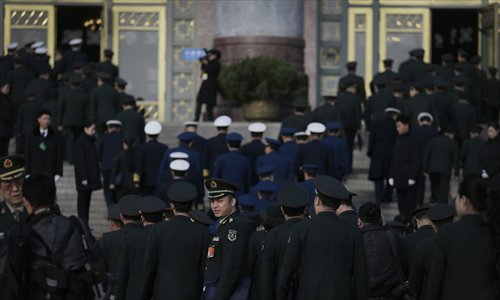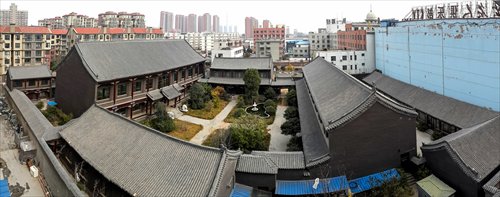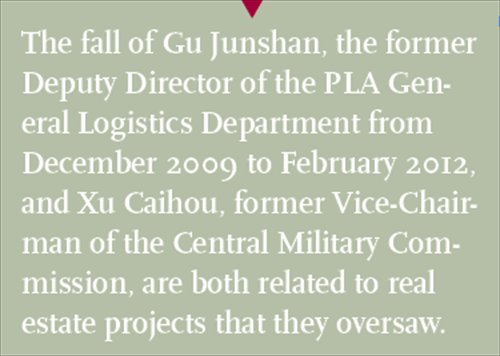PLA bans commercial activities as anti-graft drive gains momentum
China's Central Military Commission is planning to gradually terminate all the military's commercial activities. Seen as the toughest move against military commercialization in China's history, this new step will put an end to a practice that has existed for three decades, has long been a hotbed for corruption and has led to many top generals falling in disgrace due to dodgy real estate deals in recent years.

PLA deputies arrive for China's annual two legislative sessions in Beijing. Photo: IC
It was late afternoon in a second-hand electronics and auto parts market in Xiasha district, Hangzhou, East China's Zhejiang Province, and He Hong (pseudonym), a shop owner, disenchanted by the days' slack business, decided to close his shop early.
The market is shrouded in gloom not just because of the ongoing economic downturn, but also the fact that the land which the market is built on belongs to the Chinese military, whose commercial activities are now undergoing reform. Rumors have been spreading among He and other tenants that the military might want to end the market's lease and take the land back soon.
For those who are commercially involved with the Chinese military, worries like this have been on the rise after the Central Military Commission (CMC) said it in a document in March that plans to gradually terminate all paid services in the military. The move, part of China's ongoing military reform, is expected to take three years to complete.
According to the document, military units will no longer be allowed to launch new commercial programs or sign new contracts regarding paid services, and expired contracts may not be extended, the Xinhua News Agency reported. This is seen by many as an effort to modernize China's armed forces and fight against military corruption.
"This is an important decision made by the CPC Central Committee, the CMC and President Xi Jinping, and it will help to purify the troops' morale, keep the true quality and nature of the military and also focus more on core military capacity building," said Yang Yujun, spokesperson of China's Ministry of Defense, in a press conference in March.
An officer from the Beijing Military Region, who declined to be named, told the Phoenix Weekly that this is expected to be the toughest ban on the military's commercial dealings to date. "The duty of the army is getting ready for wars. How can they battle if they are shooting on the training ground, and at the same time calculating how much money they can make from a contract they just signed?" he said.

Former general Gu Junshan's luxurious residence in Puyang, Henan Province Photo: CFP
A historical problem
The commercialization of the Chinese military started in the mid 1980s, when the central government, determined to boost the economy, cut State allocations to the military. To offset these budget cuts, the military was authorized and encouraged to go into business.
In the following years, military commercialization got into full swing as People's Liberation Army (PLA) units set up thousands of factories, companies, coal mines and large conglomerates. According to an estimate conducted in the late 1990s, there were over 15,000 PLA-run companies back then, generating billions of yuan each year. Over 75 percent of their total revenue, however, was generated by conglomerates run by the headquarters of the army, navy and air forces. The military has never publicly verified these statistics.
"It was a massive trend, spreading from the top down … Mining was the most popular business, and most military units had their own coal mines in Shanxi Province," a military officer who had served during that period told the Phoenix Weekly.
While most of profits were reinvested in the military, some went into the pockets of military officials. Due to the military's connection with the central government, it was also known to engage in shady businesses such as smuggling.
This prompted Jiang Zemin, then president, to take action. A biography of Zhang Wannian, a former top PLA general, revealed that during a national anti-smuggling conference in 1998, Jiang Zemin denounced a PLA-run company for smuggling iron ore into China.
Jiang also ordered the armed forces to pull out of commercial ventures that year, and told top military officials to "earnestly carry out checks on all kinds of commercial companies set up by subsidiary units," media reported at the time.
However, due to a lack of checks and balances, the effect of the 1998 ban was limited. Although lots of PLA-run companies were deregistered and most military-owned coal mines were transferred to local governments, commercial activities still abounded in the military. Yang, the Defense Ministry spokesman, said, "After the PLA and Armed Police Force (APF) banned all commercial activities in 1998, certain external paid services were still allowed in certain units and trades such as medical services and spare real estate property leasing."

Lucrative business
Today, the military runs businesses in sectors such as telecommunications, personnel training, logistics, technology and healthcare, among others. Hospitals that belong to the military and armed police, for example, are known to outsource their medical care to private organizations, and some personnel from PLA art and performance troupes are known to perform in commercial shows.
But the most popular and potentially lucrative area of commercial dealings are in land leasing and the real estate market, many of which are actually allowed by laws and regulations despite the 1998 decree. According to the PLA Property Management Regulations, issued in 2000, for example, compensatory transfer of land use rights is allowed as long as it is approved by PLA's general logistics department. A 1995 regulation also allows PLA units to form partnerships with local governments and build real estate projects together on PLA-owned land.
The market where He Hong has his shop, for example, is just one of the hundreds of tenants in the 824-acre, military-owned plot of land in Xiasha district. Other tenants include 73 logistics companies, eight professional markets and up to 1,000 small business owners, as well as a hotel, a private hospital, a school and a kindergarten. For over 10 years, up to 10,000 people have worked in the area.
Next to the plot is over 100 acres of farmland owned by the APF, which is also leased to local businesses.
Mr Wang, a local driver, said in the 1980s, most of the area was farmland with very few residents. But as urbanization boomed and land prices soared, factories, residential areas and universities sprang up around the area. The military then started to lease land to local markets and warehouses.
Hotbed of corruption
However, as China's real estate market peaked about 10 years ago, land resources and real estate also became a hotbed for military corruption. Many commercial dealings were either not approved, or exceeded the approved area or time frame.
Among the nearly 50 "tigers" who were cracked down in China's fight against corruption in the military, many are from the general logistics department or in charge of the approval of real estate-related projects. The fall of Gu Junshan, the former Deputy Director of the PLA General Logistics Department from December 2009 to February 2012, and Xu Caihou, former Vice-Chairman of the Central Military Commission, are both related to real estate projects that they oversaw.
Wu Fangfang, the daughter-in-law of the disgraced Guo Boxiong, former vice chairman of the CMC, for example, operated a fabric wholesale market on a small plot of military land in Xiasha in 2007, where she made 800 million yuan selling leases for market space to tenants. Although the land was only allowed to be leased for 15 years, Wu sold them as being for 30 years and many investors were conned. Officials from the Zhejiang Military Region, who turned a blind eye to Wu's illegal dealings, were also convicted after Guo's fall.
A major general from the PLA's General Staff Department told the Phoenix weekly that under a market economy, the characteristics of corruption in PLA are largely similar to corruption in local governments. The most prominent issues are power-for-money deals, and the management and use of military property and capitals becoming a major source of corruption.
According to estimates by unnamed military officers, the current ban will lead to the stalling of around two thirds of military-run commercial projects, while long-term projects will require the introduction of new policies and systems to regulate them. The real estate regulations and other lease-related regulations, which allow land leasing, will likely be abolished.
According to PLA Daily, the official newspaper of the PLA, the military started a comprehensive census of military-owned infrastructure and properties in March 2013. In 2014, a new regulation was released to overhaul the land lease approval process.
Phoenix Weekly - Global Times
Newspaper headline: Moneymaking military